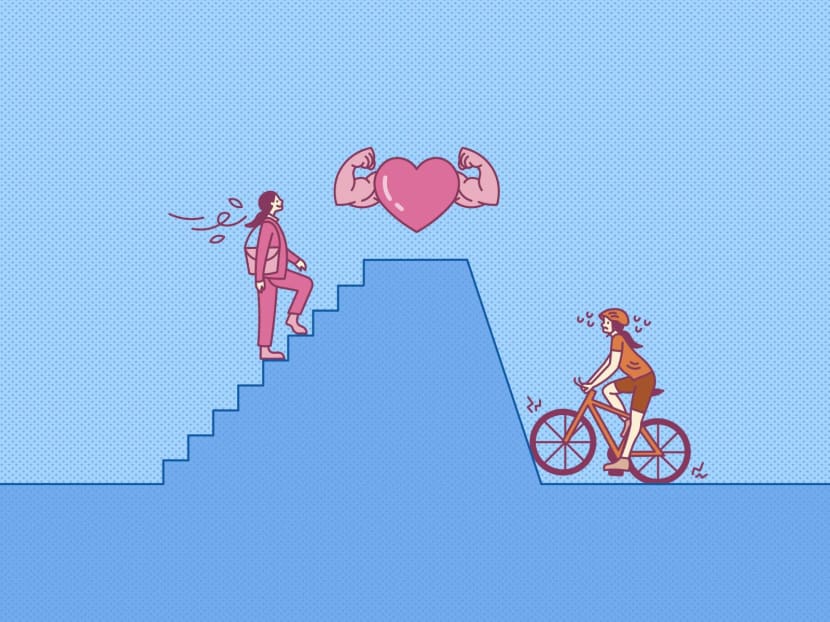Harness the power of micro habits to make the changes you want in your life
Micro habits are tiny, almost effortless actions that are too small to fail, making them easy to integrate into daily routines and helping to build long-term emotional resilience.

Many of us are unlikely to achieve with a single bound the goals we set for ourselves, so try letting micro habits give us the spring in our steps instead. (Illustration: CNA/Nurjannah Suhaimi)

This audio is generated by an AI tool.
For my latest health goal, I vowed to start a new routine: Exercise three times a week with at least one session outdoors.
Then, just half an hour into my first cycling outing at night, I found myself faceplanted on gravel, bleeding from a gash on the chin.
After slipping because of a bump on the road, my one-hour cardio session turned into a three-hour hospital visit, three stitches and a month of limping around with bandages and bruises.
Not only did I become aversed to cycling, I also stopped making promises to myself about getting fit altogether.
It was hard not to feel embarrassed after seemingly failing at something so basic, with my feeble attempt at exercise leaving me literally scarred for life.
In the weeks that followed, I couldn’t bring myself to try anything remotely intense. That was when I learned about micro habits – the idea that small, consistent actions can be more powerful than one big, doomed push.
Instead of new year’s resolutions that fizzle out by February or vague, stress-laden ambitions to “be better”, mental health professionals I interviewed said that going small can help one go far.
The idea of forming small but practical strategies to change one’s life remains popular, even if the concept is not new.
Based on information from the National Library Board, one of the most borrowed audiobooks and e-books in Singapore is Atomic Habits: An Easy & Proven Way to Build Good Habits & Break Bad Ones by James Clear.
The self-help book champions the philosophy of “tiny changes, remarkable results”.
When life already feels overwhelming, micro habits offer a way for us to feel progress since they are designed as being rather easy to accomplish and fail-proof.
So in my case, I was interested to know: Would a five-minute daily workout really help build emotional resilience? And if so, what makes micro habits stick?
WHAT ARE MICRO HABITS?
Micro habits are small, incremental behaviours that are built into one’s daily routines, Dr Kenneth Tai from the Singapore Management University (SMU) said.
For example, take a five-minute walk instead of committing to a 30-minute walk.
Dr Tai, who is from SMU's department of organisational behaviour and human resources, said that such small tasks require less self-control and allow people to overcome inertia.
Ms Qi Zhai-McCartney, a psychotherapist and coach at Seeing Qi Therapy and Coaching, said that where traditional habits or goals boil down to self-discipline and motivation, micro habits are designed to bypass that.
These tiny, actionable tasks are also simple to repeat.
In clients she sees, Ms Zhai-McCartney prompts them to imagine the smallest increment of change when trying to work towards a goal, such as taking three deep breaths mid-morning at the office instead of aiming to meditate for 20 minutes a day.
“People often get stuck when making meaningful change in their lives because they start with very big goals, like ‘get healthy’ or ‘control my anxiety’. These goals are lofty and aren’t easy starting points,” she added.
Mr Jude Edward, counsellor at online and face-to-face therapy platform Talk Your Heart Out, gave the example of taking the stairs instead of the lift as an example of a micro habit that may aid in moving towards a larger goal such as losing weight.
“When you’re overwhelmed, burnt out or just trying to get through the day, big goals can feel out of reach.
"Micro habits offer small wins without pressure. They create hope and momentum – especially when motivation is low,” he added.
SMALL STEPS TO EMOTIONAL RESILIENCE
There might be limited empirical research on micro habits, but Dr Tai from SMU said that the concept aligns with a broader body of research on goal-setting, which document the increased positive emotions and heightened sense of purpose and meaning after attaining goals.
“For new year’s resolutions and major lifestyle changes, people tend to set broad goals that require sustained motivation and long-term behavioural changes, have to resist the pull of competing goals and temptations, and be resilient when confronted with setbacks and failures.”
However, given the minimal investment needed for micro habits, these small goals could become automatic over time and build one’s confidence, prompting meaningful long-term change if one manages to eventually scale up such habits.
Micro habits also support self-efficacy, a belief that one can influence their outcomes through their own actions, which is central to resilience, Ms Zhai-McCartney said.
Over time, consistent micro habits could reprogramme one’s stress response or emotional regulation patterns, as the brain's neural pathways are strengthened by repeated behaviours, she added.
However, that is not to say that one should obsess over keeping up a streak or string of mini achievements.
Ms Zhai-McCartney said that micro habits can ironically fuel anxiety instead of reducing it when such tasks become obsessive or rigid.
“Perfectionism often disguises itself as discipline, but it’s really driven by fear.
"If someone feels they must check every box or they’ve ‘ruined everything’, that’s a red flag,” she cautioned.
To avoid veering into superstition or compulsion, her advice is for one to regularly review why one has adopted a habit, reflect on its benefits and allow oneself the flexibility to change course when needed.
THREE MICRO HABITS TO TRY
Micro habits can be very effective with a few key strategies, including anchoring these tasks to existing routines, the mental health experts said.
This is known as “habit stacking”.
For example, you may commit to writing one line in a journal or diary after making a cup of coffee, Ms Zhai-McCartney suggested.
Another strategy for success is to give yourself environmental cues, Dr Tai from SMU said.
These include tracking the micro habits visually with a calendar system to create momentum or reminding yourself of the habit with items placed at physical locations, for example, placing exercise attire by the door.
Mr Edward the counsellor proposed practising compassion even if you should miss a day without doing what you wanted to do, and adding simple rewards to tasks that you complete such as checking off a box to help reinforce a habit loop.
“These aren’t just productivity hacks. They are training for your nervous system. Practise them daily and you’ll start building confidence, emotional resilience and more capacity to handle life’s curveballs,” he said.
Here are three micro habits to build confidence and emotional resilience, as vetted by the experts.
1. Touch base with someone who understands you or say “no” to someone who doesn’t
Ms Zhai-McCartney recommended sending a quick “thinking of you” phone text message or emoji to someone who makes you feel “emotionally safe”.
“Emotional connection – even in brief doses – acts as a buffer against stress,” she said.
Micro habits can be a “radical act of self-care” on a stressful day – a small, intentional act for one’s well-being, she said.
While connecting with people who may energise us, it may also be helpful to set a micro-boundary to filter tasks that might be draining, such as delaying a reply to a non-urgent email or message, she added.
“It may show you that the world continues to function without you constantly being online and it also ‘trains’ your counterparties to know that they shouldn’t expect immediate responses from you all the time.”
2. Have a pre-work and post-work ritual
Mr Edward gave an example of how Formula One drivers use rituals to help them with their focus and emotional regulation.
For example, Lewis Hamilton visualises his race beforehand, down to how he wants to feel in his car and wearing the same gloves throughout the race weekend.
Even for non-pro athletes who are the rest of us, similar micro habits can go a long way in helping to start or end the work day right.
One way is adopting a pre-meeting ritual.
“Take three deep breaths or set a small intention, telling yourself, ‘I’ll stay grounded,’ or ‘I’ll contribute what I can today’. It helps shift you from reactive to intentional,” Mr Edward said.
After work, setting a routine to take a short walk, tidy one’s desk or change out of work clothes can help signal to one’s brain that it is time to relax.
3. Name one emotion you felt
Before bed or after brushing your teeth, ask yourself: “What emotion did I feel most strongly today?”
Ms Zhai-McCartney said that naming it may help in taming one’s emotions, because it activates the prefrontal cortex of the brain and helps to regulate the amygdala (the part of the brain that is central to processing emotional responses).
Agreeing, Mr Edward said that naming one emotion such as saying “I feel anxious” or “I feel tired” can help to build emotional awareness and regulation over time.
As for me, although I have yet to reopen the bike-sharing mobile applications in my ongoing plan to get fit, I’ve found a small but satisfying sense of achievement in something far simpler.
I am choosing the stairs over the escalator when I commute.
It’s not the adrenaline rush I imagined when I first set out on that ill-fated night ride, but these quiet, consistent choices – and the small sense of achievement that comes with them – feel like steadier and more forgiving ground, with no gravel faceplants involved.















